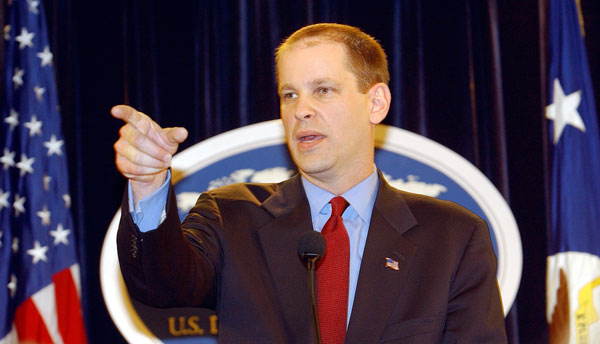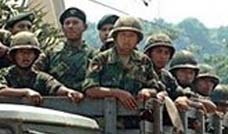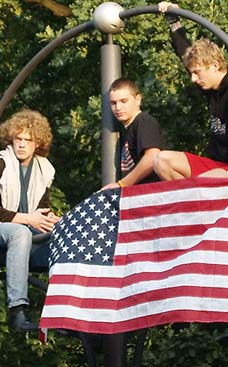
QUESTION: So the withdrawal of the Peace Corps volunteers has nothing to do with any reduction measure?
MR. MCCORMACK: Well, we want to have a good relationship with Bolivia and the people of Bolivia, and the Peace Corps is an important part of trying to help the people of Bolivia. That’s what they’re there trying to do. But of course, we have to look at the situation on the ground, and it’s our obligation to take those steps that we think are necessary to ensure that our people are able to accomplish the long-term goals of that mission. And we believe that this was a prudent step based on the situation on the ground in Bolivia.
QUESTION: So this was a – this was – prudent step given the situation on the ground, so it was a security --
MR. MCCORMACK: Security played a big part in it.
PCOL Comment: PCOL sent an inquiry to the Peace Corps Press Office asking them if Peace Corps volunteers had been withdrawn from Bolivia in part in retaliation for Bolivia's actions in expelling Ambassador Goldberg from Bolivia and here is the reply: "While the expulsion of the U.S. Ambassador was considered by the Peace Corps, the decision to temporarily suspend the Peace Corps program in Bolivia was based on the Peace Corps emergency action plan and its evaluation process for suspensions and evacuations. The safety and security of the Volunteers and their ability to do their work are the primary factors in such a decision. In the case of Bolivia, there was increasing civil unrest, including blockading of major transportation routes, a mass protest and march planned, and escalating violence against Bolivian citizens. We made the decision to consolidate the Volunteers and then to move all 113 Volunteers based on our own evaluation. All were moved safely from Bolivia to Peru."
State Department Press Secretary McCormack says "Security played a big part in the decision for the Peace Corps' to leave Bolivia"
Daily Press Briefing
Sean McCormack, Spokesman
Washington, DC
September 16, 2008
[Excerpt]
QUESTION: Bolivia. Do you plan to announce any – any new measures, you – about Bolivia, about the suspension of aid?
MR. MCCORMACK: Right. As I have said before in the past few days when I have gotten this question, we’re going to reserve the right to take a look at our relationship with Bolivia and, where we feel appropriate, to take steps that reflect the current state of that relationship. At this point, I’m not prepared to announce anything. But again, we reserve the right to review that relationship.
QUESTION: So the withdrawal of the Peace Corps volunteers has nothing to do with any reduction measure?
MR. MCCORMACK: Well, we want to have a good relationship with Bolivia and the people of Bolivia, and the Peace Corps is an important part of trying to help the people of Bolivia. That’s what they’re there trying to do. But of course, we have to look at the situation on the ground, and it’s our obligation to take those steps that we think are necessary to ensure that our people are able to accomplish the long-term goals of that mission. And we believe that this was a prudent step based on the situation on the ground in Bolivia.
QUESTION: I understand there will be an announcement on drug – on the drug report later today?
MR. MCCORMACK: At 4:30, David Johnson will be down here. I apologize for the need to reschedule that, but --
QUESTION: Okay.
MR. MCCORMACK: -- it will be done today.
QUESTION: Okay. And could this – if Bolivia was – was designated as not complying with – or not doing all efforts, it could be – and in the drug – anti-drug fight, would – would it – would it lead to a suspension of aid? Could it be --
MR. MCCORMACK: Again, Sylvie, I’m not going to try to preview either the majors list – the so-called majors list report or any other step that we may or may not take at this point.
QUESTION: So hold on. Just on the Peace Corps thing?
MR. MCCORMACK: Mm-hmm.
QUESTION: So this was a – this was – prudent step given the situation on the ground, so it was a security --
MR. MCCORMACK: Security played a big part in it.
QUESTION: And is that at all related to – I realize Peace Corps is completely separate, but it is similar to what was – the problems that were being faced by the DEA guys?
MR. MCCORMACK: Matt, I honestly don’t have the level of detail to provide you that sort of assessment. The – both had the common thread of wanting to make sure that our citizens are protected and that over the long term, they are able to do their job. You know, any sort of harm that would come to any of our personnel would imperil the ability over the long term for us to have the kind of programs that we have there right now. So the common thread of security -- I can’t tell you if it was the same kinds of concerns that led to both of those actions.
QUESTION: But yesterday, you said that you had spoken – or you had received – you had spoken to and gotten assurances from the Bolivian Government --
MR. MCCORMACK: That was concerning the Embassy.
QUESTION: Just the Embassy?
MR. MCCORMACK: Again, concerning the Embassy, yeah.
QUESTION: The physical building?
MR. MCCORMACK: Yeah. There were some – there were, apparently, in the area and in La Paz, some protests. But again, they were, as I understand it, relatively small.
QUESTION: But -- so does that mean that they specifically have not just said that they will take all measures necessary to protect --
MR. MCCORMACK: No.
QUESTION: -- U.S. Government personnel or Peace Corp volunteers?
MR. MCCORMACK: No. No, no, no. You have two different situations. One – with an embassy, you have the physical plan and you have a bit more control over a situation, as opposed to individuals being far outside, in some cases, the capital city, where we have any sort of physical plant. And you do it on a case-by-case basis in terms of the – you know, both individuals as well as programmatically, what are the right steps to take. And we will always err on the side of making sure that –
QUESTION: Well, fair enough, but I’m just wondering if --
MR. MCCORMACK: -- that our people are safe.
QUESTION: Has the Bolivian Government told you that it’s not able to assure the security of individuals?
MR. MCCORMACK: No, no, no. Not at all, Matt, no, no. I mean, again, there – in terms of doing security assessments, this much I know: They’re apples and oranges, you know. I’m not a security expert, but you have two very different situations. And we’re going to do what we think is prudent.
Yes. Okay. Yes, ma’am.












